Barriers to same-sex marriage and gender transition
Same-sex marriage is not yet allowed in Japan, but an increasing number of local governments are adopting the partnership certificates*5 . This certificate is legally not as effective as marriage, but provides advantages of, for example, being able to sign a surgical consent form at a hospital and having a visit as family. According to Dentsu Innovation Institute, as of April 2019, 426 same-sex couples have applied for this system. Gender transition is also possible if conditions, though rather strict ones, such as a doctor's diagnosis and Sex reassignment surgery (SRS) are cleared.
*5 A system with which same-sex couples who are recognized to be in a relationship relevant to that in marriage could acquire certification issued by the local government. Shibuya-ku and Setagaya-ku in Tokyo introduced this system for the first time in Japan in November, 2015.
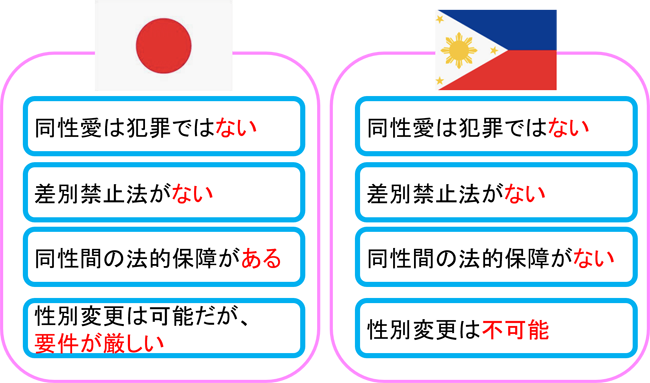
In the Philippines, on the other hand, marriage is clearly stated in the family law as "a special contract of an eternal bond between a man and a woman". There is a Christian doctrine behind this. It is clearly written that marriage is for a man and a woman. There are no partnership regulations, either. Again, since the country is dominated in number by Catholics, it is unlikely that same-sex marriage would be allowed in the Philippines. Gender transitions would not be allowed, either. "Correction" of a birth certificate is permitted, but only if there is a certain kind of error in the birth certificate. In the past, there were cases in which gender transition for intersex persons were allowed in court, but never for transgender. There is the idea that a sex transition is the same as turning away from God. As you can see, the situations in the Philippines is much more difficult, compared to Japan's situation.
Support for LGBTQ in the Philippines
The purposes of the trip to the Philippines were to investigate the support system for LGBTQ organizations, psychological assistance, and especially, the current situations of the parties involved. As a fieldwork research, I visited parties concerned to Deaf and LGBTQs, Deaf schools, sign language interpreter organizations, and LGBTQ organization of hearing persons, and was able to interview 23 persons among them.
There is an organization by the name of Pinoy Deaf Rainbow (hereinafter referred to as PDR) in Manila, which was established in 2011, as the first organization of Deaf LGBTQ people in Asia. They aim to contribute to create an open minded society, setting their goal as "We will speak up and fight to protect the LGBTQ people in the Philippines," with the cooperation of other minorities. They have proper organizational structure and elections are held annually. The current representative of the organization is Ms. Disney, who is a transgender of MTF (Male To Female). Representatives so far have always been gay persons and it is the first time that a transgender person has become a representative. They are having a wide range of activities.
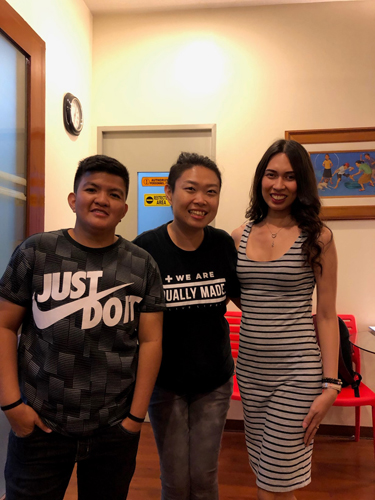
Among PDR, members promote activities with an emphasis on their identity, pride and culture as being Deaf LGBTQ. When I visited, they were trying to implement self-development and leadership programs, and having counselling, sharing ideas with each other. Members get together and discuss their matters such as their identity and thoughts what they have now. Besides providing such kind of psychological support, they also proceed with programs to achieve economic independence, capacity building and referrals for jobs by word to month, for not all members are financially successful. One example is teaching each other how to operate computers which is a necessary skill to get a job. I was impressed by the ways they work together, cooperating with each other.
Many parents of Deaf children are hearing persons. In other words, they have little understanding of their Deaf LGBTQ children. Not a few such parents get shocked. In addition, there are cases where children are worried that "I wouldn't be able to tell my parents that I am LGBTQ, after they have worked so hard to raise me, a Deaf kid." PDR members said that they would like to provide family support for such families in the future.
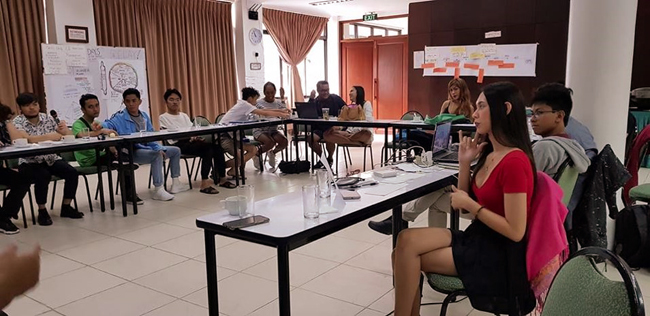
the image provided by Pinoy Deaf Rainbow
I also visited Love Yourself, the HIV / AIDS enlightenment group where Ms. Disney works. Many of the transgender people work at night, and some have unsafe sex and become infected with HIV. Deaf people are often found among the people who visit Love Yourself to get the HIV test conducted by Love Yourself. Deaf people tend to get infected with HIV due to lack of information. Ms. Disney supports them, communicating in sign language. I saw her having conversation naturally with hearing staff, using sign language. She wouldn't make walls between herself and others including hearing persons.
Ms. Disney said over and over that it would not work right as long as Deaf LGBTQ alone gather round and talk, and so, they should forge relationships positively with hearing LGBTQ community and value and keep a horizontal relationships with them. She said that they sometimes get together with hearing LGBTQ organizations, having sporting events or home parties. They are trying to interact with various people not only through serious matter but also through fun projects. Just looking at the picture, we can see a bright expressions on their faces.
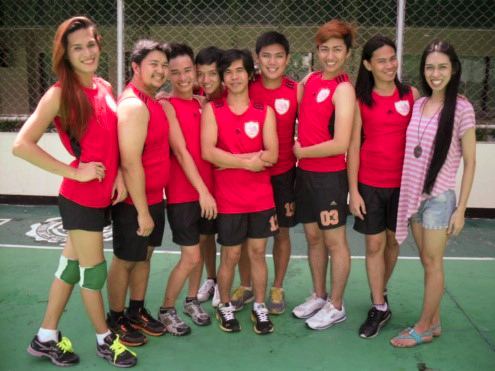
Image source: Pinoy Deaf Rainbow
While at the same time, the term LGBTQ is not something that can bracket everyone; As a lesbian, as a gay, as a transgender, the difficulty that each of them faces and support method for them differ from one person to another. Within the PDR group, there are three groups: Deaf Transgender; Deaf Lesbian and Deaf Queer. For example, Transgender has specific challenges such as hormonal treatment, which are shared by Deaf Transgender organizations. However, the three groups work together on issues that should be considered by the entire LGBTQ organization.
Looking across the whole Philippines, there are at least 6 Deaf LGBTQ organizations in Cebu, Davao, and Luzon, including PDR, and each is promoting activities, closely interacting with each other. In Japan, unfortunately, there are no cooperation among organizations. I think it is necessary for us to discuss each problem and solution in cooperation with each other from now on.
To the World Deaf LGBTQ Conference
The Deaf LGBTQ face double challenges as both Deaf and LGBTQ. It is important to support not only their identity as the Deaf, but also identity as the LGBTQ. I think it is important to provide education that makes this possible at Deaf schools, to offer a role model of the ways of life and to visualize the existence of the Deaf LGBTQ communities.
One important thing I've learned in the Philippines is that the support programs are very fulfilling in the Philippines. The curriculum is designed properly, to do this, this month, and to do that next month. Also, I was surprised that the horizontal connections are very strong in the Philippines. I feel that LGBTQ in Japan tend to cling together on their own and that we still have a long way to go. We need to feel and realize various things, through interactions with many more organizations.
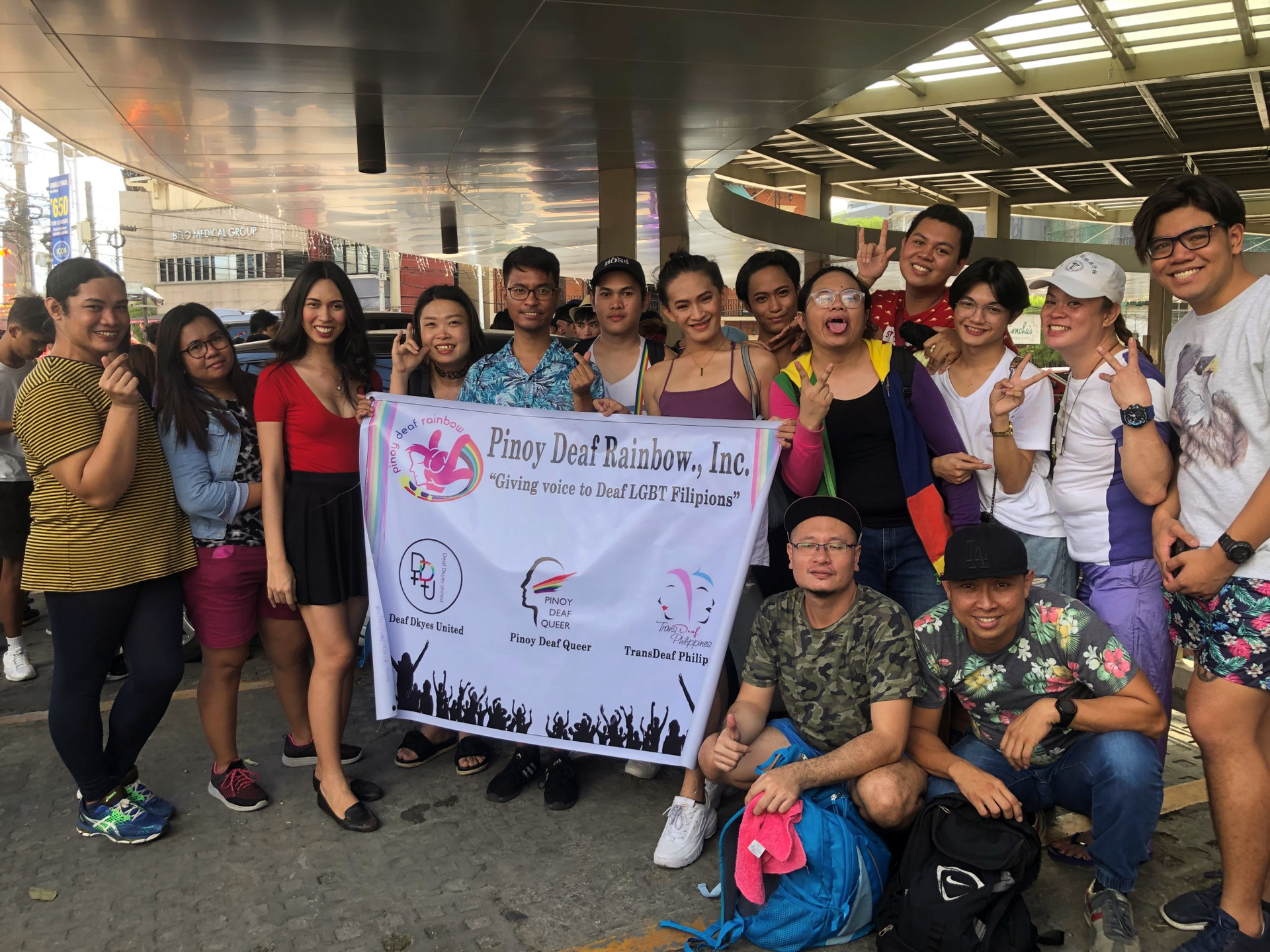
I have been to the United States but had no involvement with Asian countries. I would like to make connections with countries throughout Asia, for instance, with Taiwan, South Korea or Vietnam, with the experience in the Philippines as a start. This year, in 2019, we are hosting the "Deaf LGBTQ National Conference" in Fukuoka, where we are planning to invite PDR people to give talks and workshops for exchange. I also want to connect my network in the United States with Asia, and eventually I would like to hold a "World Deaf LGBTQ Conference." I will work toward this target and continue to do my best.
More Information
The Asia Center Fellowship Program - Fuyumi Yamamoto
Research of activities on the Deaf LGBTQ community in the Philippines
The Japan Foundation Asia Center’s grant and fellowship programs






